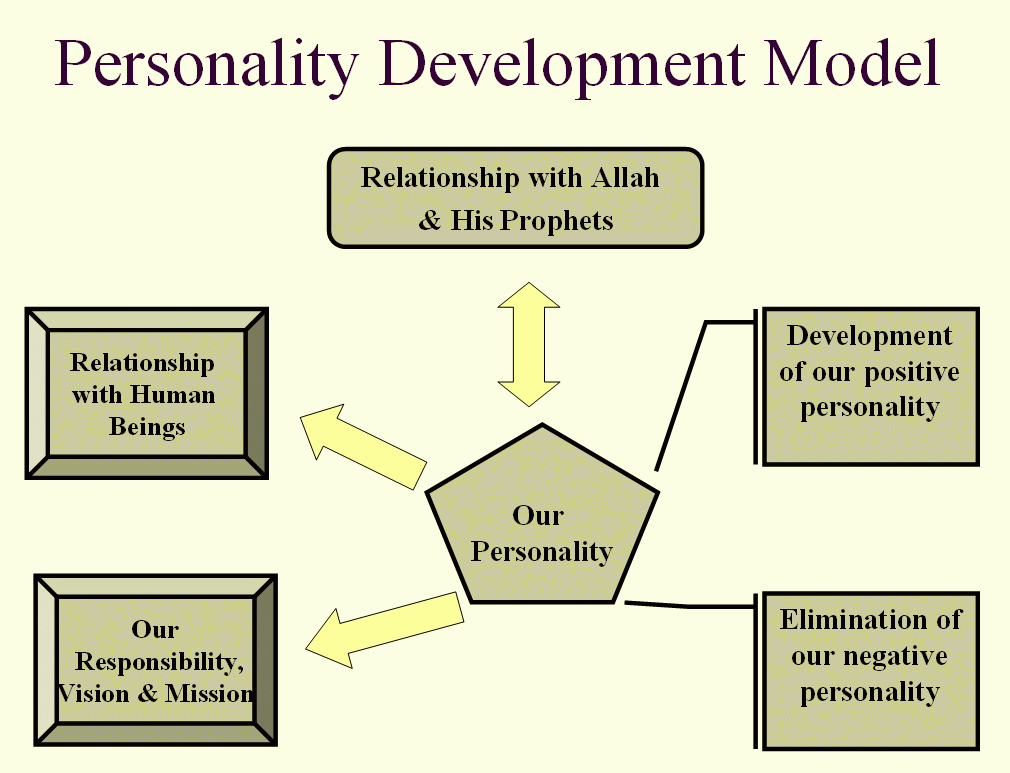Personality development
#PersonalityDevelopment
Personality Development. Personality refers to an individual’s stable tendencies to think, feel, and act in. particular ways. The field of personality psychology focuses on understanding and. assessing these individual differences in thoughts, feelings, and behavior.
شخصیت کی نشوونما۔ شخصیت سے مراد کسی فرد کے مخصوص طریقوں سے سوچنے، محسوس کرنے اور عمل کرنے کے مستحکم رجحانات ہیں۔ شخصیت کی نفسیات کا شعبہ تفہیم پر مرکوز ہے۔ خیالات، احساسات اور رویے میں ان انفرادی اختلافات کا اندازہ لگانا۔
Personality refers to the unique and consistent patterns of thoughts, feelings, and behaviors that characterize an individual. It encompasses the enduring traits and qualities that differentiate one person from another and influence how they interact with the world.
Key aspects of personality include:
- Traits: These are stable characteristics, such as extraversion, agreeableness, conscientiousness, neuroticism, and openness to experience. These traits are often measured using various psychological assessments.
- Behavior: This includes the actions and reactions of a person in different situations. Personality influences how individuals respond to their environment and handle challenges.
- Emotions: Personality affects a person’s typical emotional responses and how they manage their emotions. Some people might be more prone to positive emotions, while others might experience more negative emotions.
- Thought Patterns: The way a person thinks about themselves, others, and the world is shaped by their personality. This includes their beliefs, attitudes, and expectations.
- Interpersonal Relationships: Personality plays a significant role in how individuals form and maintain relationships. It affects communication style, empathy, and conflict resolution.
Several theories attempt to explain personality, including:
- Trait Theory: Focuses on identifying and measuring individual personality characteristics.
- Psychoanalytic Theory: Originated by Freud, this theory emphasizes unconscious motivations and early childhood experiences.
- Humanistic Theory: Centers on individual growth and self-actualization, highlighting free will and personal responsibility.
- Social-Cognitive Theory: Emphasizes the role of learning and cognition in the development of personality, highlighting the interaction between environment, behavior, and thought processes.
Understanding personality is essential in various fields, such as psychology, counseling, human resources, and personal development, as it helps predict and explain behavior, improve interpersonal relationships, and foster personal growth.
شخصیت سے مراد خیالات، احساسات اور طرز عمل کے انوکھے اور مستقل نمونے ہیں جو کسی فرد کی خصوصیت کرتے ہیں۔ اس میں پائیدار خصائص اور خوبیاں شامل ہیں جو ایک شخص کو دوسرے سے ممتاز کرتی ہیں اور اس پر اثر انداز ہوتی ہیں کہ وہ دنیا کے ساتھ کیسے تعامل کرتے ہیں۔
شخصیت کے اہم پہلوؤں میں شامل ہیں:
خصلتیں: یہ مستحکم خصوصیات ہیں، جیسے ماورائے عمل، رضامندی، ایمانداری، اعصابی، اور تجربے کے لیے کشادگی۔ ان خصائص کو اکثر مختلف نفسیاتی جائزوں کا استعمال کرتے ہوئے ماپا جاتا ہے۔
برتاؤ: اس میں مختلف حالات میں ایک شخص کے اعمال اور ردعمل شامل ہیں۔ شخصیت اس بات پر اثر انداز ہوتی ہے کہ افراد کس طرح اپنے ماحول کا جواب دیتے ہیں اور چیلنجوں سے کیسے نمٹتے ہیں۔
جذبات: شخصیت کسی شخص کے مخصوص جذباتی ردعمل کو متاثر کرتی ہے اور وہ اپنے جذبات کو کس طرح منظم کرتے ہیں۔ کچھ لوگ مثبت جذبات کا زیادہ شکار ہو سکتے ہیں، جبکہ دوسروں کو زیادہ منفی جذبات کا سامنا ہو سکتا ہے۔
سوچ کے نمونے: جس طرح سے کوئی شخص اپنے بارے میں، دوسروں کے بارے میں سوچتا ہے، اور دنیا اس کی شخصیت سے تشکیل پاتی ہے۔ اس میں ان کے عقائد، رویے اور توقعات شامل ہیں۔
باہمی تعلقات: شخصیت اس میں اہم کردار ادا کرتی ہے کہ افراد کس طرح تعلقات بناتے اور برقرار رکھتے ہیں۔ یہ مواصلاتی انداز، ہمدردی، اور تنازعات کے حل کو متاثر کرتا ہے۔
کئی نظریات شخصیت کی وضاحت کرنے کی کوشش کرتے ہیں، بشمول:
خصوصیت کا نظریہ: انفرادی شخصیت کی خصوصیات کی شناخت اور پیمائش پر توجہ مرکوز کرتا ہے۔
نفسیاتی نظریہ: فرائیڈ کی طرف سے شروع کیا گیا، یہ نظریہ لاشعوری محرکات اور ابتدائی بچپن کے تجربات پر زور دیتا ہے۔
ہیومنسٹ تھیوری: انفرادی ترقی اور خود حقیقت پسندی کے مراکز، آزاد مرضی اور ذاتی ذمہ داری کو اجاگر کرتے ہوئے۔
سماجی علمی نظریہ: شخصیت کی نشوونما میں سیکھنے اور ادراک کے کردار پر زور دیتا ہے، ماحول، رویے، اور سوچ کے عمل کے درمیان تعامل کو اجاگر کرتا ہے۔
شخصیت کو سمجھنا مختلف شعبوں میں ضروری ہے، جیسے کہ نفسیات، مشاورت، انسانی وسائل، اور ذاتی ترقی، کیونکہ یہ رویے کی پیشن گوئی اور وضاحت کرنے، باہمی تعلقات کو بہتر بنانے، اور ذاتی ترقی کو فروغ دینے میں مدد کرتا ہے۔
व्यक्तित्व विचारों, भावनाओं और व्यवहारों के अनूठे और सुसंगत पैटर्न को संदर्भित करता है जो किसी व्यक्ति की विशेषता है। इसमें स्थायी लक्षण और गुण शामिल हैं जो एक व्यक्ति को दूसरे से अलग करते हैं और प्रभावित करते हैं कि वे दुनिया के साथ कैसे बातचीत करते हैं।
व्यक्तित्व के प्रमुख पहलुओं में शामिल हैं:
लक्षण: ये स्थिर विशेषताएँ हैं, जैसे बहिर्मुखता, सहमत होना, कर्तव्यनिष्ठा, विक्षिप्तता और अनुभव के प्रति खुलापन। इन लक्षणों को अक्सर विभिन्न मनोवैज्ञानिक आकलनों का उपयोग करके मापा जाता है।
व्यवहार: इसमें विभिन्न स्थितियों में किसी व्यक्ति की क्रियाएँ और प्रतिक्रियाएँ शामिल हैं। व्यक्तित्व प्रभावित करता है कि व्यक्ति अपने पर्यावरण पर कैसे प्रतिक्रिया करता है और चुनौतियों से कैसे निपटता है।
भावनाएँ: व्यक्तित्व किसी व्यक्ति की सामान्य भावनात्मक प्रतिक्रियाओं और उसके द्वारा अपनी भावनाओं को प्रबंधित करने के तरीके को प्रभावित करता है। कुछ लोग सकारात्मक भावनाओं के प्रति अधिक प्रवण हो सकते हैं, जबकि अन्य अधिक नकारात्मक भावनाओं का अनुभव कर सकते हैं।
विचार पैटर्न: जिस तरह से कोई व्यक्ति अपने बारे में, दूसरों के बारे में और दुनिया के बारे में सोचता है, वह उसके व्यक्तित्व से आकार लेता है। इसमें उनकी मान्यताएँ, दृष्टिकोण और अपेक्षाएँ शामिल हैं।
पारस्परिक संबंध: व्यक्तित्व इस बात में महत्वपूर्ण भूमिका निभाता है कि व्यक्ति कैसे संबंध बनाते और बनाए रखते हैं। यह संचार शैली, सहानुभूति और संघर्ष समाधान को प्रभावित करता है।
कई सिद्धांत व्यक्तित्व की व्याख्या करने का प्रयास करते हैं, जिनमें शामिल हैं:
विशेषता सिद्धांत: व्यक्तिगत व्यक्तित्व विशेषताओं की पहचान करने और मापने पर ध्यान केंद्रित करता है।
मनोविश्लेषणात्मक सिद्धांत: फ्रायड द्वारा उत्पन्न, यह सिद्धांत अचेतन प्रेरणाओं और बचपन के शुरुआती अनुभवों पर जोर देता है।
मानवतावादी सिद्धांत: व्यक्तिगत विकास और आत्म-साक्षात्कार पर केंद्रित है, स्वतंत्र इच्छा और व्यक्तिगत जिम्मेदारी पर प्रकाश डालता है।
सामाजिक-संज्ञानात्मक सिद्धांत: व्यक्तित्व के विकास में सीखने और अनुभूति की भूमिका पर जोर देता है, पर्यावरण, व्यवहार और विचार प्रक्रियाओं के बीच बातचीत पर प्रकाश डालता है।
मनोविज्ञान, परामर्श, मानव संसाधन और व्यक्तिगत विकास जैसे विभिन्न क्षेत्रों में व्यक्तित्व को समझना आवश्यक है, क्योंकि यह व्यवहार की भविष्यवाणी करने और उसे समझाने, पारस्परिक संबंधों को बेहतर बनाने और व्यक्तिगत विकास को बढ़ावा देने में मदद करता है।
What is personality development?
In this modern world there are many techniques to deal with issues that come in our personal and professional life. Personality is the most important of them the issues about his own. Sometimes we understand that it is not an external power that is causing the problem, but we do not have anything right and we are not getting the desired result of our labor. However, the problem can also be solved. We need to en-root ourselves and understand the concern of taking an interest in any good personality development course.
We are familiar with the word “personality development”, but many of us know its meaning during its actual tenure. What is personality development? We often wonder about this discussion.

Personality Development
Personality development or personal development is the improvement of certain life skills, which is essential for one’s happiness and successful development.These life skills are like pillars on which our entire career has been established and therefore the success and failure of our enterprises in life depends on the choice of those skills.
If we start making our lives based on some wrong skills then the fall is inevitable. You can get success but it can never be permanent. So in the case of happiness and success, for long-lasting development in life, we first need to develop ourselves. Personality development not only allows you to build your overall form and skills, but also the way you communicate with others is important because your visual appeal is important.
Everyone has some good in them. No piano plays well, no one has to cook a good meal or is great in organizing and managing any teams. These are our skills but they are used for a fixed period of one day.However, the life skills we are talking about make use of 24 × 7 in our lives to improve for themselves and others. So the question is, what can be answered in personality manipulation because there are many ways to explain it.
Why Do We Need Personality Development?
This is nothing extra in our life, static can be ignored. There is a basic requirement for success and happiness in life; Be it personal or professional.You can be a great team manager or get high academic qualifications or learn all the latest techniques in your area, but none of them can help you achieve the desired goals unless you have a How to become a smart person
First of all, you need to develop your skills as a person, and then you can use any of your other professional talents to influence people.
Some Basic Tips for Personality Development:
- Be yourself. Do not try to copy someone else. Be factual and convinced about your personality
- Learn to communicate well, improve your English speaking skills.
- Understand the difference between self-confidence and ego. You do not need to be harsh on anyone to show your self-confidence.
- Make a plan in your life and try to live a life accordingly.
- Be a good listener, let others speak their thoughts and listen carefully to them in the discussion. Otherwise you can not talk to them while talking
- It is good to work hard but it is better to do smart work. Try to be productive and enjoy your work.
- Calculate the time and money spent, both are valuable.
- Be gentle and courteous, but be steadfast while organizing something. Do not allow anyone to take advantage of your humility.
- Be helpful to others.
- And most importantly, be honest in your personal and professional life.
Hope this discussion will help you to understand what personality development is and helps you to acquire the speed in your personality.
The 6 Personality Types and How They Impact Your Career Choice [2024]
by Mike Petrusky on April 24, 2023
FREE RESOURCE
Future of The Employee Experience
Table of Contentshide
What this means for workplace managers
People are happier and most productive when their career choice matches their type of personality, a widely accepted theory developed from The Holland Codes.
Researcher, John Holland, believed character traits of people work best when paired with jobs that utilize their strengths and are tailored to how they work best, resulting in more work and higher quality work.
How does this fit into managing a workspace? How your employees feel at the office, and their working environment will impact everything they do.
According to Holland, six key categories define the modern worker. His assessment offers a framework that considers interest in career choice and pairs ideal environments for types of personalities that also play a role in job satisfaction and performance.
Table of Contents hide
What this means for workplace managers
The Six Personality types
The six types are Realistic, Investigative, Artistic, Social, Enterprising, and Conventional. The theory classifies people into their respective categories by evaluating how a person approaches life situations — and most people fall into more than one category. People with the same personality type tend to work best with others of their type, while certain types work best alone or with specific groups over others.
Read through the 6 types of personalities and take into consideration the employee experience at your workplace. In the future, when creating teams or hiring new employees, it could benefit everyone to pair individuals with those they are most likely to succeed with.
Realistic (Doer)
Someone who likes to work mainly with their hands by making and fixing things, assembling operating equipment or using facility management software. They sometimes prefer working outdoors and find joy in a career that performs various manual labor. The Realistic individual works well with tools, machines, and mechanical drawings. Valuing practical things they can see and touch, they often see themselves as practical, mechanical, and goal oriented.

Best when working: Alone or with others in the Realistic category
Compatible with: Investigative or Conventional
Best career choice for the Realistic type:
- Carpenter
- Electrician
- Pilot
- Engineer
- Mechanic
- Facilities manager
Investigative (Thinker)
The most analytical of the six personalities, this detail oriented group loves to study and solve math or science-related problems. They aren’t skilled negotiators but work best in a career choice that lets them work with others who are grounded. They see themselves as precise, intellectual, and goal oriented people that like to be acknowledged for their achievements.

Best when working: Alone or with other investigative individuals
Compatible with: Realistic or Artistic
Best career choice for the Investigative type:
- Biologist
- Mathematician
- Computer Programmer
- Surveyor
- Pharmacist
Artistic (Creator)
This group of individuals values others who are expressive and independent with an openness to experience. They naturally admire the creative arts, including writing and music, and have high levels of creativity. They see themselves as expressive and original and prefer to avoid a career choice that requires highly ordered or repetitive activities. They enjoy working in groups, but only if they are allowed expressive freedom and are encouraged to share their ideas.

Best when working: In groups that allow creative expression and unsystematic teams
Compatible with: Investigative and Social
Best career choice for the Artistic type:
- Graphic Designer
- Musician
- Book Editor
- Art Teacher
- Actor
Social (Helper)
Those with a Social personality type like to “dominate” their environment. This is the most common category of the six, and many people have traits of this category along with their others. They particularly value providing services for others and enjoy a career choice that enables them to work closely with people. Their ideal working conditions are with other people who are also trustworthy, helpful, and show appreciation.

Best when working: In group and team situations where they feel needed
Compatible with: Artistic and Enterprising
Best career choice for the Social type:
- Counselor
- Librarian
- Social Worker
- Physical Therapist
- Nurse
Enterprising (Persuader)
Enterprising personalities are the people you want on your team when it comes to getting things done. They’re energetic, confident and assertive, and they don’t shy away from a challenge. They can be extroverted or introverted, but they all share some common traits: they’re ambitious, hard-working and willing to try new things.

Best when working: In groups and with all types of people in a leadership position
Compatible with: Social and Conventional
Best career choice for the Enterprising type:
- Sales Manager
- Real Estate Agent
- School Principal
- Attorney
- Hotel Manager
Conventional (Organizer)
A member of this group would prefer a career choice where they can work with numbers, records, or machines. They enjoy repetitive tasks done in an orderly fashion and like to avoid ambiguous activities. They see themselves as organized and good at following directions. They value success in business and enjoy working with other people. However, they do best in small, systematic groups where they know their responsibilities.

Best when working: In groups that have defined duties assigned to all
Compatible with: Enterprising or Realistic
Best career choice for the Conventional type:
- Bookkeeper
- Secretary
- Bank Teller
- Mail Carrier
- HR Consultant
What this means for workplace managers
When planning your office’s environment, consider the variance in career choice these six categories tend to enjoy working in.
Artistic and Enterprising individuals are probably more drawn to a career choice in marketing and sales and would likely enjoy interacting if grouped together.
Be sure to give your Investigative and Realistic groups space to work alone, but consider offering them smaller and private gathering spots to choose from if their career requires them to work with others.
Your Conventional and Social departments — most likely those whose career choice is in HR and possibly security — should be placed where they’ll have lots of interaction with people and opportunities to help others.
Consider placing Conventional near your Artistic and Enterprising groups considering these individuals are likely to make a career choice that lets them enjoy working in teams.
Taking it a step further, when looking into the design for your workplace, consider the career choice and types of environments each personality would thrive.
Because they are prone to picking a career choice that involves working with varying groups of people, your Artistic and Enterprise groups most likely enjoy lots of colored and movable space so they can stretch their creative talents. However, your Realistic employees may prefer a quieter tone in their workspace to analyze data with workplace analytics software.
